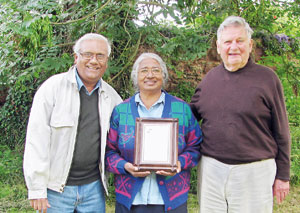News
Top international award for Peradeniya scientist
View(s):
Prof. Savitri Gunatilleke with her PhD “guru”, Prof. Peter Ashton, and her husband, Prof. Nimal Gunatilleke, holding the plaque for the award of an Honorary Fellowship of the Association of Tropical Biology and Conservation
The Association for Tropical Biology and Conservation (ATBC), the premier global organisation with a mission to foster scientific understanding and conservation of tropical ecosystems, has awarded its 2016 Honorary Fellowship to Professor Savitri Gunatilleke, Emeritus Professor at the University of Peradeniya.
Prof. Gunatilleke is the first Sri Lankan to receive this award, made at the ATBC’s 53rd Annual Congress in Montpellier, France last month.
The award is given to researchers who have demonstrated life-long distinguished service to science and have been an inspiration and role model for younger scientists and students of tropical biology.
The ATBC said Prof. Gunatilleke’s selection was unanimous, with nominations including researchers from the United States, United Kingdom, India, France and Indonesia.
Founded in 1963, the ATBC Honorary Fellowship Award is considered one of the highest accolades a researcher in the field of tropical biology can receive, with more than 80 scientists around the world being honoured so far – of whom only six have been women.
The main area of Prof. Gunatilleke’s research has been the Sinharaja rainforest. In the 1970s, the Sinharaja forest was logged by the state forestry enterprise. Her research and conservation promotion contributed in large part to the eventual designation of the Sinharaja as a World Heritage Site.
Prof. Gunatilleke graduated with a first class honours degree in Botany from the University of Ceylon in 1969. She completed her MSc in Ecology, and also obtained her PhD – on a paper entitled “The Ecology of the Endemic Tree Species of Sri Lanka in Relation to their Conservation” – in 1975 from the University of Aberdeen under the supervision of the world-renowned tropical forest expert, Professor Peter Ashton.
“In fact, I wanted to study plant pathology – the science of studying causes and effects of plant diseases – but Professor B.A. Abeywickrama, then head of the Botany Department at Peradeniya, suggested I study forest ecology. It was a decision that changed my academic career,” she said.
The higher studies were challenging for the shy research student. “Quite frankly, I had not been to a forest when I started my PhD studies and I hardly knew how to identify different plants in the field. So I had to learn fast but luckily I had supportive local supervisors,” Prof. Gunatilleke.
She pays tribute to her undergraduate teachers, professors M. D. Dassanayake and S. Balasubramaniam, who helped her tremendously to gain this knowledge during her formative years.
As the distribution patterns of Sri Lanka’s endemic tree species growing in the different lowland climates unravelled during her Ph.D. field research, Prof. Gunatilleke’s bond with the forests grew. She pays tribute to her team of field researchers and field assistants for her success.
Later, she tied the knot with another academic in the field, Prof. Nimal Gunatilleke. “Nimal has been of great strength to me,” she said, adding she was lucky to have a research partner at home.
Prof. Gunatilleke was a pioneer in taking university students to the field for forest studies. Earlier, the practice was that even forest ecology had been taught in the classroom without stepping into a forest.
When asked why that practice could not continue, she was persuasive. “Sri Lanka’s forests are among the best ‘outdoor laboratories’ to study biological diversity. But it was a time that the university had limited resources so we had to push the administration to convince the importance of these field studies,” Prof. Gunatilleke said, recalling the time she introduced “multi-day” field courses to her students.
Prof. Gunatilleke has a long history of mentorship of a younger generation of Sri Lankan tropical scientists, with a number of them serving in reputed international and national institutions.
Savitri Gunatilleke is an outstanding role model for scientists in Sri Lanka and women scientists in particular. Apart from her academic work, which is evident from her many influential publications, she also committed herself to the advancement of ecology and conservation in Sri Lanka’s development. She has been a member of Sri Lanka’s National Man and Biosphere committee and helped to prepare the country’s Biodiversity Action Plan (1997) to name but two of many contributions.

